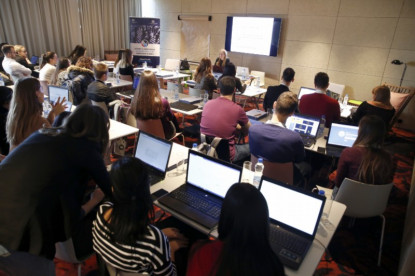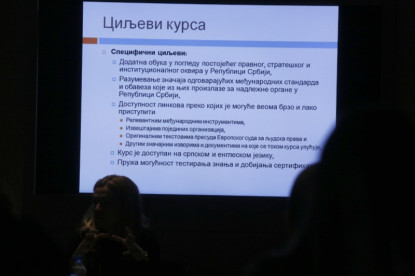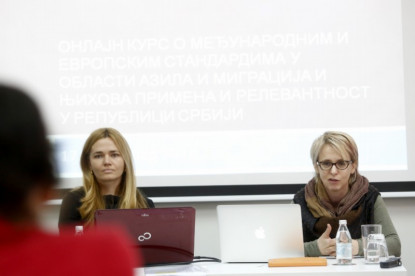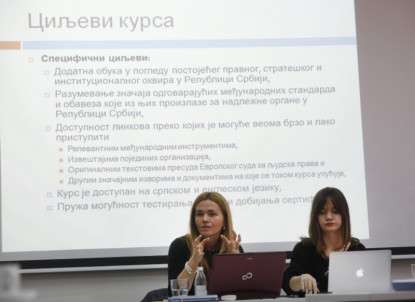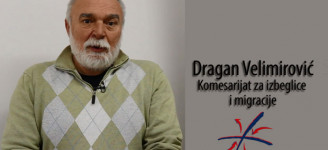Online course on Asylum and Migration Standards was presented to the law students and representatives of state authorities.
The online course on International and European standards in the field of asylum and migration and its application and relevance in the Republic of Serbia was introduced to about 40 students of the Law School of the Belgrade University, including the students from Asylum and Refugee Legal Clinic, at the promotional event held at the Mama Shelter Hotel yesterday. The Course was created within the project “Support to strengthening migration and asylum management in Serbia” and prof. dr. Bojana Čučković, Associate Professor at the Law School and the coauthor of the course talked about it to the lawyers-to-be.
First, the attendees were presented the course consisting of five chapters, each of which is divided into two parts. The first part of each chapter discusses the analysis of international instruments and the practice of international institutions that exercise supervision of their enforcement, while the second part presents relevant constitutional and legal norms in the legal system of the Republic of Serbia with examples showcasing the practice of administrative and judicial bodies of the Republic of Serbia.
After that, the students, together with prof. dr. Čučković, reviewed the selected fifth chapter and analyzed in detail the definition of collective expulsion, the relevant universal and regional international standards which directly or indirectly regulate collective expulsion, as well as the principles and standards concerning the prohibition of collective expulsion of aliens derived from the jurisprudence of the European Court of Human Rights. The standards established by decisions of the European Court were presented interactively in such a way that the facts from a selected case were described, not including the final judgment of the Court. Then the students discussed various disputable issues and in so doing found the answers on their own, and debated the position of the Court and established standards. Prof. Dr. Bojana Čučković, told them how European Convention and the European Court of Human Rights see the collective expulsion of asylum seekers and stressed that although, in asylum-related cases, ECHR does adjust its approach that was adopted in other cases, it never deviates from basic standards established for other categories of aliens.
The attendees were then explained the importance of international standards on prohibition of collective expulsion for the procedure of the competent authorities of the Republic of Serbia, given the fact that internal law of the Republic of Serbia does not contain explicit prohibition of collective expulsion of aliens. However, the prohibition results both from the constitutional obligation to directly apply Article 4 of Protocol No. 4 to the European Convention of Human Rights and numerous legal norms which regulate status of aliens and asylum seekers and provide for mandatory examination of a particular situation of each alien.
The final part of promotional event was dedicated to the presentation of online test to the attendees, which is the integral part of the online course.
The second presentation of the online course was delivered on Monday, 17 December 2018, but this time it was intended for professionals. The significance of the online course for everyday work of various state authorities participating in the asylum procedure was presented to attendees, both from the perspective of strengthening capacities by acquiring further knowledge about relevant international and European standards, and through the possibility to, after the course ends, use the course material in the regular everyday work of the competent authorities. Namely, the course primarily aims at providing additional training within the existing legal framework of the Republic of Serbia, as well as informing attendees about the international and European standards relating to asylum and migration, and explaining obligations for the authorities of the Republic of Serbia arising from the standards.
Via links provided within the course, the attendees can quickly and simply gain access to various useful materials, like international conventions, reports of organizations, original texts of judgments of ECHR, and other important sources and documents relevant for their everyday work.
On the same occasion, the attendees were announced the second part of the online course whose preparation is in the final stage. The same methodology will be used for this new course. It too will be composed of five chapters, but it will have new topics that were identified as being significant in the context of new legal solutions that came into force in 2018. The topics that would be dealt with in the second part of the online course concern the approach to territory and procedures, freedom deprivation and limitation of freedom of movement, family reunification, protection of special migrant groups, and process guaranties in the case of expulsion.






